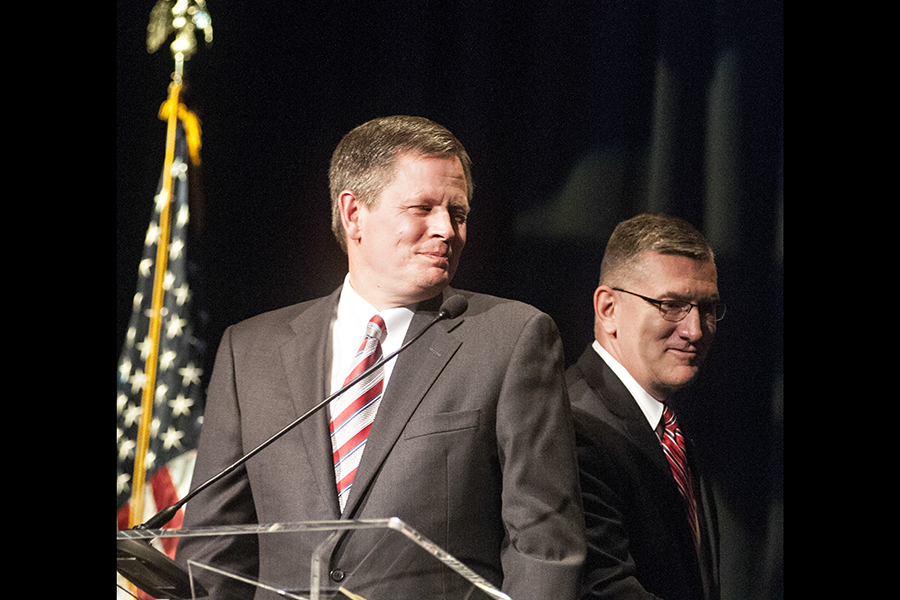Steve Daines has rocketed from the unknown to being the face of the Montana Republican Party and the favorite to take a U.S. Senate seat that has been in Democratic control for a century, all before completing a full term in Congress.
To hear the Bozeman Republican tell it, his rise is the product of “old-fashioned retail politics” that still matter in the vast smallness of Montana. That means heading to far-out places, getting to know people over coffee and listening to their problems.
“I’ve got a grill guard on my truck and we travel all over Montana,” he told The Associated Press in a recent interview.
But there’s more to that kind of success than gathering road dust. It takes a little luck, some careful strategy and a whole lot of money.
Daines, 52, got lucky when former U.S. Rep. Denny Rehberg exited politics after losing the 2012 U.S. Senate race against incumbent Jon Tester, leaving Daines the undisputed top dog of the GOP.
His luck struck again when Democratic opponent, U.S. Sen. John Walsh, dropped out of this year’s race. The party selected Rep. Amanda Curtis of Butte to run with no money and little name recognition.
Then there is the strategy. Since a failed run for lieutenant governor in 2008, Daines has run for only open seats, not against incumbents.
He considered running against Tester in 2012, but then switched to the House race when Rehberg announced that he was leaving the seat open to campaign for Senate.
Last year, Daines announced his run for Senate in 2014 when U.S. Sen. Max Baucus said he wouldn’t run for another term.
Montana State University political scientist David Parker called Daines an “ambitious amateur” who has run at the right time for various offices. “He chose his moments carefully,” Parker said.
Finally, there is the money. Daines spent 27 years in the private sector working for the corporate giant Procter & Gamble and then for a technology startup called RightNow Technologies that was bought by another corporate giant, Oracle.
Those connections helped Daines create a network of deep-pocketed donors who have helped fund his $5 million campaign to date.
Procter & Gamble was listed as Daines’ third-biggest donor as of the end of June, with employees and political-action committees donating more than $27,000 by the end of June, according to the Center for Responsive Politics. He also has received the support of RightNow’s influential founder, Greg Gianforte.
With that money, a successful strategy and a little luck, Daines has built the brand that he lacked in 2012. But how well do the voters know the man?
“Most voters will vote for him because they know who he is, and they have the vague impression that he is a decent guy,” Parker said. “Do they have much depth of knowledge beyond that for Steve Daines? I think not.”
Democratic Party spokesman Bryan Watt called Daines an “empty suit” who will say or do anything to get elected, and whose time in Congress was spent supporting measures to privatize Medicare, sell off public lands and support the interests of the wealthy at the expense of the middle and lower class.
“Daines was born on third base and thinks he hit a home run. He doesn’t have the first idea of what it means to be a working Montanan, to struggle to put food on the table, and to make ends meet,” Watt said.
Daines said his career has been about putting Montana first. When he was away from the state he loves, he was looking for ways to get back, he said.
Daines got his start with Procter & Gamble in 1984 as an entry level manager in Iowa City, Iowa, after graduating from Montana State University. There, he met his wife, Cindy, who was a student.
They moved to Guangzhou, China, in January 1992, as Procter & Gamble was looking to expanding into the emerging Chinese market.
Montana Democrats have portrayed Daines’ time then as working to open factories in China while the company was laying off workers in the U.S. Daines said he was there to build and expand American brands overseas.
Daines quit Procter & Gamble to return to Montana in 1997 and worked as a vice president for his father’s construction company until he joined RightNow in 2000, where he stayed until his House run.
Daines’ has introduced nearly two dozen bills and amendments with limited success— one of the banes of being a freshman in a deadlocked Congress.
Parker previously analyzed Daines’ House votes and said he was the most conservative congressman from Montana since World War II.
Despite his brief legislative experience, Daines said he is ready to take a seat in the Senate.
“That will be up to the people, if I’m ready,” he said. “I’m always learning, any job that I’ve done. I’m up to the task.”
